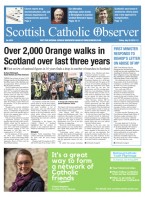BY Ryan McDougall | July 26 | ![]() 0 COMMENTS
0 COMMENTS ![]() print
print

Compassion not decriminalisation is needed to combat drug crisis, Church says
Scotland should address underlying problems with drug addiction rather than opt for legalisation, the Church has said as a Catholic charity called for more ‘compassion and love’ for those affected by the problem.
The Mungo Foundation, a Glasgow Archdiocese charity that supports a wide range of people in the city with problems including addiction, spoke following the recent revelation that the number of Scotland’s drug-deaths for 2018 was 1,187—a 27 per cent increase on 2017.
The huge spike has seen Scotland named the drug-death capital of Europe.
Shocking figures
The figures were released by the National Statistics Publication for Scotland, which revealed Greater Glasgow and Clyde, Lothian, Lanarkshire and Tayside were the areas with the most drug-deaths.
Opiates, opioids, and benzodiazepines were the most common killers, and 72 per cent of those killed by the substances were male.
The Mungo Foundation told the SCO the statistics ‘should shock all of us’ and that ‘any drug related death is one too many.’
Underlying issues
The charity believes issues such as inequality, poverty, justice and education are all factors in the spike in drug-deaths, and called upon Catholics to help those at risk.
A spokesperson said: “Our Catholic communities are well-placed to welcome those who find themselves isolated and on the fringes of society into the parishes and into their community places.
“We ask parishes and neighbourhoods to understand that drug dependence can happen to anyone, and touches all of us on a personal level.
“We would ask you to consider ways in which parishes can reach out to those struggling and to share experience of supporting those with others.
“People who are in the drug using community appreciate friendship and kindness. Indeed by adopting a non-judgemental approach, and offering practical supports, such as food banks, community cafes, and housing assistance we could make a difference to the lives of our neighbours.”
Emergency
Joe Fitzpatrick MSP, minister for Public Health, Sport and Wellbeing said Scotland is facing a drug-death ‘emergency,’ and that harm-reduction is the best means of saving lives.
Mr Fitzpatrick told the SCO: “Our alcohol and drug strategy recognises that more must be done to improve the quality and provision of treatment and support services in order to better meet the complex health and social needs of those most at risk as a result of their drug use.”
Plan of action
He added that the government is to publish an action plan in order to best implement the strategy, and said he has requested an ‘urgent meeting’ with the UK Home Secretary Sajid Javid to discuss drug deaths and drug use in Scotland.
After the statistics were revealed, the All-Parliamentary Group for Drug Policy Reform wrote to Mr Javid, pushing for the introduction of Overdose Prevention Centres (OPCs), which allow drug addicts to inject under supervision. They claimed in a letter that this could lower the death rates.
Unsafe
However, the Catholic Church in Scotland has rejected the idea. A spokesperson said: “There is no quick-fix solution to the crisis or a ‘safe injecting room.’ It is never safe to inject extremely harmful, illegal and potentially fatal substances.
“Drug abuse not only impacts individual health and wellbeing, but has an enormous and corrosive effect on families, communities and wider society.”
Further action
The spokesperson added that current harm reduction is ‘not working and drug related deaths have more than doubled between 2007 and 2017.’
“Initiatives should be targeted towards prevention programmes, long term recovery and rehabilitation. Indeed, society must come together to create the conditions for people to live free from drugs, by tackling the deeply entrenched and inter-related scourges of poverty, inequality, homelessness and addiction,” they said.
“Many parishes, often in the most deprived areas, are acutely affected by this issue and offer spiritual guidance and practical support to individuals and their families.”










